|
|
|
Sort Order |
|
|
|
Items / Page
|
|
|
|
|
|
|
| Srl | Item |
| 1 |
ID:
115088
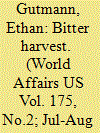

|
|
|
|
|
| Publication |
2012.
|
| Summary/Abstract |
When Wang Lijun made his break for the US consulate in Chengdu on the night of February 6th, he was in a unique position to reveal a series of damaging stories about his superior, Bo Xilai: Bo's familial connection to the suspected murder of British businessman Neil Heywood, siphoning of Chongqing's public funds, and shakedowns of local criminal and triad elements. As former head of the Chongqing Public Security Bureau, Wang also knew that Bo, as Chongqing party secretary, had engaged in surveillance of Politburo members, potentially implying that Bo and other players aligned with Jiang Zemin's faction-most prominently, Zhou Yongkang, secretary of the powerful Political and Legislative Affairs Committee (PLAC)-were thinking about seizing power. Faced with the complexity of China's leadership transition crisis, most Western editors played up the Sopranos aspect of the sordid tale, fixing on the alleged Heywood murder, essentially the same interpretation being relentlessly pushed by the Chinese Communist Party-controlled media, and allowed an even more sinister story to slip by virtually unnoticed. On March 23rd, China's vice minister of health, Huang Jiefu, publicly declared the country's intention to end "organ donations" from executed prisoners. Yet the euphemism didn't conceal the reality, for on the night of February 6th, Wang was in a unique position to reveal one more story-specifically, how the party has been harvesting the organs of their political enemies for years.
|
|
|
|
|
|
|
|
|
|
|
|
|
|
|
|
| 2 |
ID:
116091
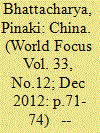

|
|
|
| 3 |
ID:
119103
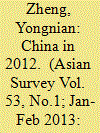

|
|
|
|
|
| Publication |
2013.
|
| Summary/Abstract |
For China, the year 2012 was politically significant with a once-a-decade power transfer taking place. However, the year was full of political scandals and rumors. From the top elite circles to the grassroots, Chinese feel increasingly anxious and frustrated. This paper examines what has gone wrong with China's elite politics, and how Chinese social groups have responded.
|
|
|
|
|
|
|
|
|
|
|
|
|
|
|
|
| 4 |
ID:
117179
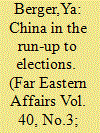

|
|
|
| 5 |
ID:
115611
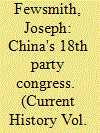

|
|
|
|
|
| Publication |
2012.
|
| Summary/Abstract |
Will the instinct to reinforce the rules of elite politics . . . undermine the leadership's ability to respond to the issues that Bo Xilai and the New Left aired?
|
|
|
|
|
|
|
|
|
|
|
|
|
|
|
|
| 6 |
ID:
114840
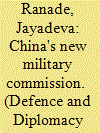

|
|
|
| 7 |
ID:
126846
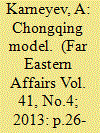

|
|
|
|
|
| Publication |
2013.
|
| Summary/Abstract |
In the second part of this article (the first was published in Far Eastern Affairs, # 3, 2013), the author continues to seek answers to a number of questions associated with the need for an objective assessment of the so-called "Chongqing model.
|
|
|
|
|
|
|
|
|
|
|
|
|
|
|
|
| 8 |
ID:
141429
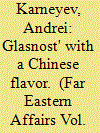

|
|
|
|
|
| Summary/Abstract |
The author examines the gradually changing pattern of public discussions in Chinese-language cyberspace, which is becoming global along with the development of new information technologies. He also analyzes the role of certain foreign Chinese-language mass media that became widely known at the time of the Bo Xilai scandal.
|
|
|
|
|
|
|
|
|
|
|
|
|
|
|
|
| 9 |
ID:
115085
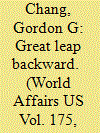

|
|
|
|
|
| Publication |
2012.
|
| Summary/Abstract |
As April passed into May this year, one electrifying story replaced another in the consciousness of the Chinese public. The first involved a ruthless official struggling for control of the ruling Communist Party and the second a solitary activist who, without this being his stated intention, challenged the one-party state from below. Soon, the two narratives began to merge, posing a threat of the first order to China's increasingly fragile political system.
|
|
|
|
|
|
|
|
|
|
|
|
|
|
|
|
| 10 |
ID:
128511
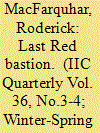

|
|
|
| 11 |
ID:
116105
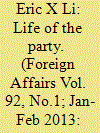

|
|
|
|
|
| Publication |
2013.
|
| Summary/Abstract |
In November 2012, the Chinese Communist Party (CCP) held its 18th National Congress, setting in motion a once-in-a-decade transfer of power to a new generation of leaders. As expected, Xi Jinping took over as general secretary and will become the president of the People's Republic this March. The turnover was a smooth and well-orchestrated demonstration by a confidently rising superpower. That didn't stop international media and even some Chinese intellectuals, however, from portraying it as a moment of crisis. In an issue that was published before the beginning of the congress, for example, The Economist quoted unnamed scholars at a recent conference as saying that China is "unstable at the grass roots, dejected at the middle strata and out of control at the top." To be sure, months before the handover, the scandal surrounding Bo Xilai, the former party boss of the Chongqing municipality, had shattered the CCP's long-held facade of unity, which had underwritten domestic political stability since the Tiananmen Square upheavals in 1989. To make matters worse, the Chinese economy, which had sustained double-digit GDP growth for two decades, slowed, decelerating for seven straight quarters. China's economic model of rapid industrialization, labor-intensive manufacturing, large-scale government investments in infrastructure, and export growth seemed to have nearly run its course. Some in China and the West have gone so far as to predict the demise of the one-party state, which they allege cannot survive if leading politicians stop delivering economic miracles.
|
|
|
|
|
|
|
|
|
|
|
|
|
|
|
|
| 12 |
ID:
115403
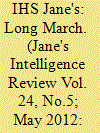

|
|
|
| 13 |
ID:
129044
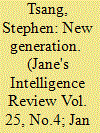

|
|
|
| 14 |
ID:
114853
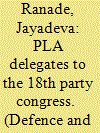

|
|
|
| 15 |
ID:
113767
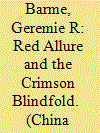

|
|
|
|
|
| Publication |
2012.
|
| Summary/Abstract |
This essay takes as its starting point the precipitous fall of Bo Xilai in March 2012 and discusses the context of the abiding significance of China's red legacies, in particular Maoism, in understanding the People's Republic of China today. While thinkers labour to salvage Marxism, the red legacy constitutes a body of cultural, intellectual, and linguistic practices that are profoundly ingrained in institutional behaviour in China. This study explores to what extent this version of the red legacy leeches out the power of other modes of leftleaning critique and independent thought, and abets the party-state in its pursuit of a guided, one-party neo-liberal economic agenda.
|
|
|
|
|
|
|
|
|
|
|
|
|
|
|
|
| 16 |
ID:
138153
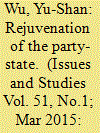

|
|
|
|
|
| Summary/Abstract |
It is widely recognized that the political system in the PRC is more institutionalized and predictable than in the past, and that its regular rejuvenation is a source of strength. While not denying the virtues of the age-based system, this paper argues that there are limits on the forced rejuvenation scheme. It looks at how cadres on the CCP’s Central Committee are excluded from competing for the top leadership positions because of their age. Four groups of elite are identified, T2 (zongshuji, zongli), SCP-T2 (changwei), PB-SCP (juwei), and CC-PB (zhongwei), and their frustration over exclusion from competing for the T2 positions in the next major leadership turnover (next even-numbered Party Congress) measured (Exclusion and Frustration Rate, EFR). An overall score is also calculated to measure the total frustration with the system (Total Exclusion and Frustration, TEF). It is shown that the EFR and TEF are extremely high, and tension is bound to accumulate in the system. Finally, the Bo Xilai (薄熙來) case is explored to demonstrate how aspiring cadres may be discriminated against by the system and thus inclined to rebel against it. It is advised that instead of simply accepting the system as it stands and calculating how personnel decisions will be churned out, more attention should be given to its limits and sustainability in the long term.
|
|
|
|
|
|
|
|
|
|
|
|
|
|
|
|
| 17 |
ID:
115862
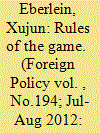

|
|
|
| 18 |
ID:
124200


|
|
|
|
|
| Publication |
2013.
|
| Summary/Abstract |
In the year that has passed since the "Chongqing drama" began, a great many works have been published that throw light on the unique experience of the socioeconomic development of one of China's regions. Was there truly a "Chongqing model"? If so, what were its distinguishing features? What kind of future might the leftist leanings of the public political spectrum have after the 18th CPC Congress? This article attempts to answer a number of questions associated with the need for an objective assessment of the "Chongqing model."
|
|
|
|
|
|
|
|
|
|
|
|
|
|
|
|
|
|
|
|
|